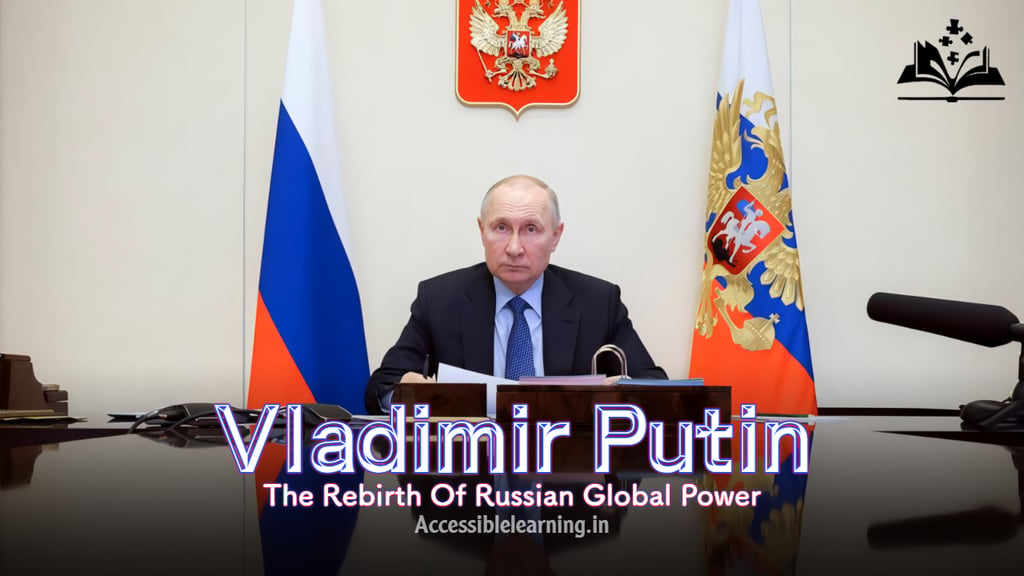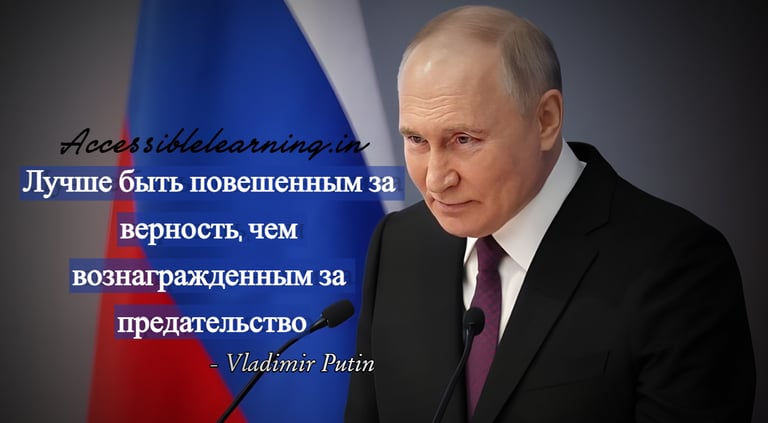
From the KGB to the Kremlin: The Journey of Vladimir Putin!
Explore the life and legacy of Vladimir Putin, the architect of modern Russia. From his rise in the KGB to his influence on global politics, discover how this enigmatic leader has shaped Russia's domestic and foreign policies, leaving a lasting impact on the world.
THE GREAT LEADERPOLITICAL JOURNEYBIOGRAPHYRUSSIABIOGRAPHY/HISTORY
Kim Shin
11/19/20248 min read


Vladimir Putin, one of the most influential and controversial global leaders of the 21st century, has shaped Russia’s domestic and foreign policies for over two decades. Born on October 7, 1952, in Leningrad (now St. Petersburg), Putin rose from humble beginnings to become the President of Russia, a position he has held since 2000, apart from a brief stint as Prime Minister from 2008 to 2012. This article delves into Putin's life, political journey, leadership style, and the impact he has had on Russia and the world.
Early Life and Career
Humble Beginnings in Leningrad
Vladimir Vladimirovich Putin was born into a working-class family in the post-war Soviet Union. His father was a factory worker and World War II veteran, while his mother worked as a homemaker. Life in Leningrad was tough, and Putin grew up in a communal apartment, sharing modest living quarters with multiple families.
From an early age, Putin showed a keen interest in sports, particularly judo, which he pursued passionately and credits for instilling discipline and resilience in him.
Education and Entry into the KGB
Putin graduated from Leningrad State University in 1975 with a degree in law. It was during his time at university that he was recruited into the KGB, the Soviet Union's security agency. Putin served as a KGB officer for 16 years, including a five-year posting in East Germany. His time in the KGB played a significant role in shaping his worldview, fostering a sense of pragmatism and strategic thinking.
Rise to Political Power
Early Political Career
After the collapse of the Soviet Union in 1991, Putin returned to Leningrad and worked as an advisor to the city's mayor, Anatoly Sobchak. His administrative skills and loyalty earned him recognition, and by 1996, he had moved to Moscow, where he climbed the political ladder under Boris Yeltsin’s presidency.
Becoming President
In August 1999, Putin was appointed as Russia's Prime Minister by President Boris Yeltsin. His tough stance on the Second Chechen War and his image as a decisive leader quickly gained him popularity. On December 31, 1999, Yeltsin unexpectedly resigned, making Putin the acting President of Russia.
He won the presidential election in March 2000, marking the beginning of his long tenure as Russia’s leader.
Putin’s Leadership and Policies
Domestic Policies: Stability and Consolidation
Putin's early presidency was marked by efforts to stabilize Russia following the economic chaos and political turmoil of the 1990s.
Economic Reforms and Growth
Putin introduced reforms to stabilize the economy, benefiting from rising global oil prices. Between 2000 and 2008, Russia’s GDP grew significantly, lifting millions out of poverty. Key industries, particularly energy, were brought under state control, consolidating Russia’s economic power.
Centralization of Power
Putin restructured the federal system, reducing the autonomy of Russia’s regions and increasing control from Moscow. This move, while criticized by some as authoritarian, was justified by Putin as necessary to maintain national unity and prevent further fragmentation.
Modernization and Infrastructure
Investments in infrastructure, healthcare, and education became priorities, though progress in these areas has been uneven. Putin also spearheaded digital initiatives, aiming to modernize Russia’s economy and reduce reliance on Western technologies.
Foreign Policy: Reasserting Russia’s Role!
Putin’s foreign policy is characterized by a focus on reasserting Russia as a global power and countering Western influence.
NATO and the West
Putin has been vocal about his opposition to NATO’s eastward expansion, which he perceives as a threat to Russia’s security. This has led to strained relations with Western countries, particularly after Russia’s annexation of Crimea in 2014.
Strengthening Ties with Non-Western Nations
Under Putin, Russia has cultivated closer ties with China, India, and Middle Eastern nations, positioning itself as a key player in a multipolar world. Energy exports, military cooperation, and trade agreements have been central to these relationships.
Military Interventions and Strategic Influence
Russia’s involvement in Syria and its support for regimes aligned with its interests demonstrate Putin’s strategy of using military power to secure geopolitical influence.

Controversies and Criticism
While Putin's leadership has been praised for restoring stability and elevating Russia’s global stature, it has also faced significant criticism.
Authoritarianism and Human Rights
Critics accuse Putin of suppressing political opposition, limiting media freedoms, and curbing civil liberties. High-profile cases, including the imprisonment of opposition leader Alexei Navalny, have drawn international condemnation.
Economic Inequality and Corruption
Despite economic growth, wealth inequality remains a major issue in Russia. Oligarchic control over key industries and allegations of corruption have marred Putin’s administration.
Annexation of Crimea and Sanctions
The annexation of Crimea in 2014 led to international sanctions, isolating Russia economically and politically. While popular domestically, this move has deepened tensions with Western nations.
Leadership Style and Legacy
Putin’s leadership style is characterized by pragmatism, decisiveness, and a focus on Russia’s sovereignty. He often portrays himself as a man of the people, engaging in outdoor activities such as fishing, hiking, and judo to project an image of strength and vitality.
Domestic Legacy
Putin’s tenure has undeniably transformed Russia. While his policies have restored stability and improved living standards for many, they have also entrenched a centralized power structure that critics argue stifles political diversity and innovation.
Global Influence
Putin’s vision of a multipolar world challenges Western dominance, and his assertive policies have reshaped global geopolitics. His tenure will be remembered for both his strategic successes and the controversies that have surrounded him.
Putin’s KGB Years and German Experience?!
During his time as a KGB officer in Dresden, East Germany, Putin was known for his unassuming demeanor and keen analytical skills. A notable story from this period occurred during the fall of the Berlin Wall in 1989. As protesters surrounded the KGB headquarters in Dresden, Putin reportedly took the initiative to negotiate with the crowd, ensuring the safety of personnel and sensitive documents. This incident is often cited as an example of his ability to remain calm under pressure.
Putin’s time in Germany also shaped his worldview. Fluent in German, he developed an understanding of European political dynamics, which later influenced his policies as President.
Rise to Power: The Chechen War
Putin’s ascent to power was bolstered by his strong stance during the Second Chechen War (1999–2000). As Prime Minister, he launched a military campaign to reclaim control over the restive region, emphasizing the need for a strong and unified Russia.
In a memorable moment that defined his public image, Putin declared, “We will pursue terrorists everywhere. If we catch them in the toilet, we will wipe them out in the outhouse.” This tough rhetoric resonated with Russians who longed for stability after years of chaos, propelling Putin into the national spotlight and helping him secure the presidency in 2000.
Putin and the Oligarchs
When Putin became President, Russia’s economy was dominated by oligarchs who had amassed immense wealth and power during the privatization of state assets in the 1990s. Putin sought to reduce their influence, famously summoning the country’s top oligarchs to a meeting in 2000.
During this meeting, he laid down a clear rule: they could keep their wealth if they stayed out of politics. Those who defied him, such as Mikhail Khodorkovsky, faced severe consequences. Khodorkovsky, once Russia’s richest man, was arrested in 2003 on charges of fraud and tax evasion. His imprisonment sent a strong message about Putin’s authority and reshaped Russia’s power structure.
Public Persona and Staged Adventures?!
Putin has carefully cultivated an image of strength and vitality, often appearing in the media engaging in adventurous activities. Some of these events have become iconic, including:
Swimming with Dolphins and Riding Bare-Chested
Putin’s outdoor exploits, such as riding a horse bare-chested in Siberia or diving into icy waters, are part of a larger narrative portraying him as a man of action.
Discovering Ancient Artifacts
In 2011, Putin participated in an underwater expedition in the Black Sea, where he “discovered” ancient amphorae. Critics later alleged the discovery was staged, but the event still contributed to his image as a leader deeply connected to Russia’s history and culture.


Putin’s Connection with Animals?!
Putin is often depicted as an animal lover, a trait that resonates with the Russian public. His interactions with animals have included:
Saving a Siberian Tiger: During a 2008 trip to a wildlife reserve, Putin allegedly tranquilized a Siberian Tiger to save a group of journalists. This story, though dramatic, has been questioned for its authenticity.
Gifted Dogs: Putin has received several dogs as gifts from foreign leaders, including a Bulgarian shepherd named Buffy and an Akita named Yume. These moments highlight his soft side and help humanize his public persona.
Annexation of Crimea: A Pivotal Moment?!
The annexation of Crimea in 2014 is one of the most controversial episodes of Putin’s presidency. Following Ukraine’s Euromaidan protests and the ousting of its pro-Russian president, Putin seized the opportunity to reclaim Crimea, citing the region’s historical ties to Russia and the need to protect Russian-speaking citizens.
The move was widely celebrated in Russia, with many seeing it as the restoration of national pride after the Soviet Union’s dissolution. However, it drew international condemnation, leading to economic sanctions and strained relations with the West.
Strengthening Ties with the Orthodox Church?!
Putin has cultivated a strong relationship with the Russian Orthodox Church, positioning it as a cornerstone of Russian identity. Under his leadership, the Church has regained significant influence, playing a key role in promoting conservative values and national unity.
This alliance has bolstered Putin’s popularity among traditionalist and religious Russians, even as it has raised concerns among liberal and secular groups.
Vision for a Multipolar World
Putin’s foreign policy is rooted in the belief that the world should not be dominated by a single superpower. He has consistently advocated for a multipolar world order, where Russia, China, India, and other nations act as counterweights to Western influence.
This vision has led to closer ties with China through initiatives like the Shanghai Cooperation Organization and partnerships with countries in Africa and Latin America, where Russia has sought to expand its influence through trade, energy, and military cooperation.
Putin’s Personal Life: A Private Man
Despite his public persona, Putin is notoriously private about his personal life. He was married to Lyudmila Putina from 1983 to 2013, and the couple has two daughters, Maria and Katerina. Both daughters have largely avoided the spotlight, pursuing academic and professional careers under assumed names.
Rumors about Putin’s wealth, personal relationships, and health have fueled speculation, but he has rarely addressed such topics publicly, maintaining a carefully controlled image.
Endurance in Leadership
Putin’s ability to maintain his grip on power for over two decades is a testament to his political acumen. Constitutional changes in 2020 allowed him to potentially remain in office until 2036, extending his influence further. Critics argue this move consolidates authoritarianism, while supporters view it as a guarantee of stability in uncertain times.


Vladimir Putin’s role as the architect of modern Russia is undeniable. His leadership has defined Russia’s path in the 21st century, restoring its position as a major global power. Whether viewed as a stabilizer or a divisive figure, his influence on Russia and the world will be studied and debated for generations to come.
As Putin continues to navigate complex domestic and international challenges, his legacy will ultimately depend on how he balances national ambitions with the aspirations of the Russian people and the demands of a rapidly evolving world.
Subscribe to our newsletter
All © Copyright reserved by Accessible-Learning
| Terms & Conditions
Knowledge is power. Learn with Us. 📚


